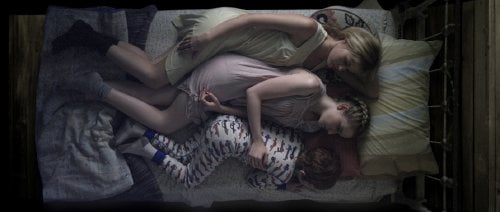We Are What We Are 2013

When their mother, Emma (Kassie Wesley DePaiva, TV's 'One Life to Live'), dies suddenly, Frank Parker (Bill Sage, "Mysterious Skin") informs his girls, Iris (Ambyr Childers, "The Master") and Rose (Julia Garner, "Martha Marcy May Marlene"), that they'll have to take over her work. But mom's chores weren't typical, as their religion, created by pioneer ancestors in the 1700's, requires great secrecy in the preparation of a meal that is against all laws but their own God's in "We Are What We Are."
Laura's Review: C+
Director Jim Mickle and his cowriter Nick Damici previously made the inventive, regional vampire film "Stake Land." For their third collaboration, they're reinvented the Mexican cannibal tale "We Are What We Are," moving the urban tale back into the American heartland. But in so doing, even if Mickle and cinematographer Ryan Samul are masters at painting this landscape, they've also tied their cannibal family to countless others in American film. Mickle and Damici have come up with a couple of very imaginative details to adorn their tale, but in the end the story itself feels preordained, everything slowly unfurling exactly how you'd expect (except, perhaps, for its over-the-top finale). How more interesting this might have been set in middle class suburbia rather than down a dirt road in the Catskills. The film begins with forebodings as Mrs. Parker does her errands surrounded with images of commercial butchery (a Fleischman's Pork van, meat being ground, the twine and saw she's there to purchase). We can see she's in some sort of medical crisis by the fright apparent in her face and the shaking of her hands. She leaves the shop, heads towards her car, stops in front of a post adorned with a missing poster and blood begins to spill out of her mouth. She pitches forward, bangs her head and falls into a puddle which quickly consumes her in the pouring rain. At the Parker home (the same farmhouse used in "Another Earth," dressed for a family out of step with modern times), grief doesn't stop tradition. It's the first day of 'abstinence.' 'No meat, no fruit, no grain' Rose tells perpetually hungry little brother Rory (Jack Gore). In his shed, Frank's hands tremble as he hangs up a watch (a nod to the original film's watch repairing dad). Gradually we learn more about this family and their place in the community. When the girls visit Doc Barrow (Michael Parks, "Django Unchained") to identify their mother's body, they have to remind him who they are. Dressed in drab, conservative garb, hair pinned up, they clearly don't get out much. When a teenaged girl is reported missing, Deputy Anders (Wyatt Russell, "Cowboys & Aliens") visits Iris, a classmate of both his and the girl's, and her social life looks like it might be about to change. Then Doc Barrow's dog finds something disturbing downstream, but something Sheriff Meeks (cowriter Damici) doesn't have the time for. We also learn his own teenaged daughter disappeared years before so he has a personal stake in proving his theory and gets the deputy on his team. Suspense is created via the Parker's neighbor Marge (Kelly McGillis, "Top Gun," "Stake Land"), good-hearted but also perhaps too curious for her own good. When Frank gifts her with a brooch after his wife's funeral, it's hinted that it might set the stage for courtship. But what about those noises she hears coming from Frank's shed? Mickle's cast his film well, Sage's mournful disciplinarian inviting sympathy while Childers and Garner create sisters who are best friends, but staggered on the submissive scale by age of influence. Parks's country doctor turned forensics detective gives us the perspective of an insider whose world is upended. Mickle and Samul define sense of place with a nostalgic appreciation of disappearing American small town life, natural beauty and simple dwellings conveying an innocence lost. But flashbacks to the Parkers' ancestors offer weak explanation for religious tradition held for centuries (the original's socioeconomic themes were much stronger). "We Are What We Are's" artful craft serves little purpose.

